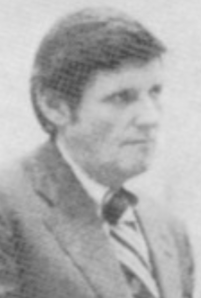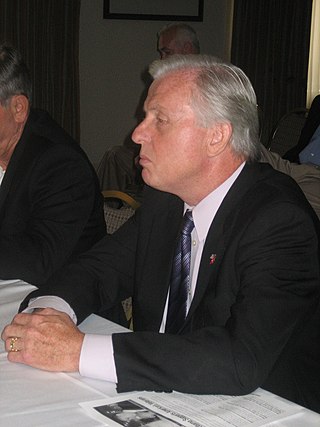
The 1972 United States presidential election was the 47th quadrennial presidential election held on Tuesday, November 7, 1972. Incumbent Republican president Richard Nixon defeated Democratic U.S. senator George McGovern in a landslide victory. With 60.7% of the popular vote, Richard Nixon won the largest share of the popular vote for the Republican Party in any presidential election.

The 1982 United States Senate elections were held on November 2, 1982. They were elections for the United States Senate following Republican gains in 1980. The 33 Senate seats of Class 1 were up for election in 1982. A total of four seats changed hands between parties, with Democrats winning seats in New Jersey and New Mexico, and Republicans taking seats in Nevada and the seat of the lone independent, Senator Harry Byrd Jr., in Virginia. Democrats made a net gain of one seat bringing them to 46 seats, while Republicans stayed at 54 seats for a majority. However, the Democratic gain in New Jersey replaced a Republican that had been appointed earlier in the year.

The 1980 United States Senate elections were held on November 4, coinciding with Ronald Reagan's victory in the presidential election. The 34 Senate seats of Class 3 were contested in regular elections. Reagan's large margin of victory over incumbent Jimmy Carter gave a huge boost to Republican Senate candidates, allowing them to flip 12 Democratic seats and win control of the chamber for the first time since the end of the 83rd Congress in January 1955.

The 1974 United States Senate elections were held on November 5, with the 34 seats of Class 3 contested in regular elections. They occurred in the wake of the Watergate scandal, Richard M. Nixon's resignation from the presidency, and Gerald Ford's subsequent pardon of Nixon. Economic issues, specifically inflation and stagnation, were also a factor that contributed to Republican losses. As an immediate result of the November 1974 elections, Democrats made a net gain of three seats from the Republicans, as they defeated Republican incumbents in Colorado and Kentucky and picked up open seats in Florida and Vermont, while Republicans won the open seat in Nevada. Following the elections, at the beginning of the 94th U.S. Congress, the Democratic caucus controlled 60 seats, and the Republican caucus controlled 38 seats.

The 1972 United States Senate elections were held on November 7, with the 33 seats of Class 2 contested in regular elections. They coincided with the landslide re-election of Republican President Richard Nixon. Despite Nixon's landslide victory, Democrats increased their majority by two seats. The Democrats picked up open seats in Kentucky and South Dakota, and defeated four incumbent senators: Gordon Allott of Colorado, J. Caleb Boggs of Delaware, Jack Miller of Iowa, and Margaret Chase Smith of Maine. The Republicans picked up open seats in New Mexico, North Carolina, and Oklahoma, and defeated one incumbent, William B. Spong Jr. of Virginia.

Richard Schultz Schweiker was an American businessman and politician. A member of the Republican Party, he served as the 14th U.S. Secretary of Health and Human Services under President Ronald Reagan from 1981 to 1983. He previously served as a U.S. Representative (1961–1969) and a U.S. Senator (1969–1981) from Pennsylvania. In 1976, Schweiker was Reagan's running mate during his unsuccessful presidential campaign.

The 1970 United States Senate elections was an election for the United States Senate. It took place on November 3, with the 33 seats of Class 1 contested in regular elections. Special elections were also held to fill vacancies. These races occurred in the middle of Richard Nixon's first term as president. The Democrats lost a net of three seats, while the Republicans and the Conservative Party of New York picked up one net seat each, and former Democrat Harry F. Byrd Jr. was re-elected as an independent.

The 1968 United States Senate elections were elections for the United States Senate. Held on November 5, the 34 seats of Class 3 were contested in regular elections. They coincided with the presidential election of the same year. The Republicans picked up five net seats in the Senate. This saw Republicans win a Senate seat in Florida for the first time since Reconstruction.

Peter Francis Flaherty was an American politician and attorney. He served as assistant district attorney of Allegheny County from 1957 to 1964, a member of the Pittsburgh City Council from 1966 to 1970, the 54th mayor of Pittsburgh from 1970 to 1977, United States deputy attorney general during the Carter administration from 1977 to 1978, and county commissioner of Allegheny County from 1984 to 1996.

Edward Maurice Mezvinsky is an American politician and lawyer from Iowa. He is a former U.S. Representative and felon. A Democrat, he represented Iowa's 1st congressional district in the U.S. House of Representatives for two terms (1973–77).
The Pennsylvania Republican Party (PAGOP) is the affiliate of the Republican Party in the state of Pennsylvania. It is headquartered in Harrisburg. As of May 2024, it controls a majority of the Senate of Pennsylvania, two statewide offices, and 8 U.S. House seats.

The 1962 California gubernatorial election was held on November 6, 1962. The Democratic incumbent, Pat Brown, ran for re-election against former U.S. vice president and 1960 Republican presidential nominee Richard Nixon. In his concession speech the following morning, Nixon accused the media of favoring his opponent Brown, stating that it was his "last press conference" and "You won't have Nixon to kick around any more." Six years later, Nixon was elected President of the United States, and exactly ten years after this press conference he was re-elected in a landslide.

Jack E. Wagner is an American Democratic politician from the Commonwealth of Pennsylvania. He served as Pennsylvania Auditor General, and previously served in the State Senate and Pittsburgh City Council.

The 1996 United States Senate election in Alabama was held on November 5, 1996. Incumbent Democratic U.S. Senator Howell Heflin decided to retire. Republican Jeff Sessions won the open seat, becoming the first of his party to win this seat since Reconstruction in 1868 and only the second Republican ever to be popularly elected to the U.S. Senate from Alabama.
Richard Nixon served as the 37th president of the United States from 1969 to 1974. He previously served as the 36th vice president of the United States from 1953 to 1961, and as a United States senator from 1950 to 1953 and United States representative from 1947 to 1950.

The 1978 Pennsylvania gubernatorial election was held on November 7, 1978. Incumbent Governor Milton Shapp was constitutionally ineligible to run for a third consecutive term in office. Republican Dick Thornburgh defeated Democrat Pete Flaherty in the general election.

The 1980 United States Senate election in Pennsylvania was held on November 4, 1980. Incumbent Republican U.S. Senator Richard Schweiker decided to retire, instead of seeking a third term.

The 2012 United States Senate election in Pennsylvania was held on November 6, 2012, alongside a presidential election, other elections to the United States Senate in other states, as well as elections to the United States House of Representatives and various state and local elections. Incumbent Democratic U.S. Senator Bob Casey, Jr. ran for and won re-election to a second term, defeating Republican nominee Tom Smith, and Libertarian nominee Rayburn Smith.

The 1968 United States elections were held on November 5, and elected members of the 91st United States Congress. The election took place during the Vietnam War, in the same year as the Tet Offensive, the assassination of Martin Luther King, Jr., the assassination of Robert F. Kennedy, and the protests of 1968. The Republican Party won control of the presidency, and picked up seats in the House and Senate, although the Democratic Party retained control of Congress.

The 1968 United States Senate election in Pennsylvania was held on November 5, 1968. Incumbent Democratic U.S. Senator Joseph S. Clark Jr. sought re-election to a third term but was defeated by Republican U.S. Representative Richard Schweiker. This election marked the last time that an incumbent Senator lost re-election to this seat.





















